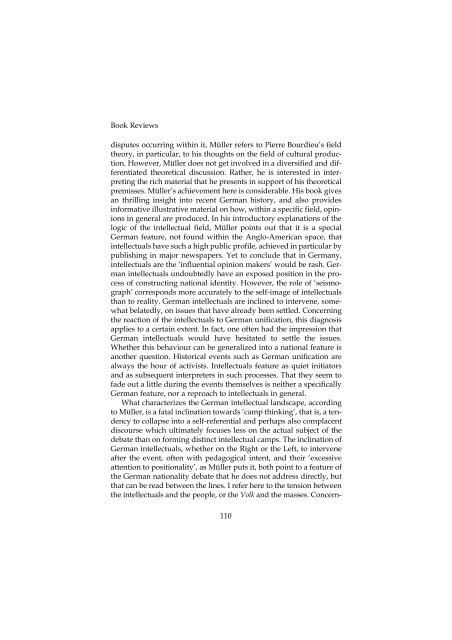Download - German Historical Institute London
Download - German Historical Institute London
Download - German Historical Institute London
Create successful ePaper yourself
Turn your PDF publications into a flip-book with our unique Google optimized e-Paper software.
Book Reviews<br />
disputes occurring within it, Müller refers to Pierre Bourdieu’s field<br />
theory, in particular, to his thoughts on the field of cultural production.<br />
However, Müller does not get involved in a diversified and differentiated<br />
theoretical discussion. Rather, he is interested in interpreting<br />
the rich material that he presents in support of his theoretical<br />
premisses. Müller’s achievement here is considerable. His book gives<br />
an thrilling insight into recent <strong>German</strong> history, and also provides<br />
informative illustrative material on how, within a specific field, opinions<br />
in general are produced. In his introductory explanations of the<br />
logic of the intellectual field, Müller points out that it is a special<br />
<strong>German</strong> feature, not found within the Anglo-American space, that<br />
intellectuals have such a high public profile, achieved in particular by<br />
publishing in major newspapers. Yet to conclude that in <strong>German</strong>y,<br />
intellectuals are the ‘influential opinion makers’ would be rash. <strong>German</strong><br />
intellectuals undoubtedly have an exposed position in the process<br />
of constructing national identity. However, the role of ‘seismograph’<br />
corresponds more accurately to the self-image of intellectuals<br />
than to reality. <strong>German</strong> intellectuals are inclined to intervene, somewhat<br />
belatedly, on issues that have already been settled. Concerning<br />
the reaction of the intellectuals to <strong>German</strong> unification, this diagnosis<br />
applies to a certain extent. In fact, one often had the impression that<br />
<strong>German</strong> intellectuals would have hesitated to settle the issues.<br />
Whether this behaviour can be generalized into a national feature is<br />
another question. <strong>Historical</strong> events such as <strong>German</strong> unification are<br />
always the hour of activists. Intellectuals feature as quiet initiators<br />
and as subsequent interpreters in such processes. That they seem to<br />
fade out a little during the events themselves is neither a specifically<br />
<strong>German</strong> feature, nor a reproach to intellectuals in general.<br />
What characterizes the <strong>German</strong> intellectual landscape, according<br />
to Müller, is a fatal inclination towards ‘camp thinking’, that is, a tendency<br />
to collapse into a self-referential and perhaps also complacent<br />
discourse which ultimately focuses less on the actual subject of the<br />
debate than on forming distinct intellectual camps. The inclination of<br />
<strong>German</strong> intellectuals, whether on the Right or the Left, to intervene<br />
after the event, often with pedagogical intent, and their ‘excessive<br />
attention to positionality’, as Müller puts it, both point to a feature of<br />
the <strong>German</strong> nationality debate that he does not address directly, but<br />
that can be read between the lines. I refer here to the tension between<br />
the intellectuals and the people, or the Volk and the masses. Concern-<br />
110













